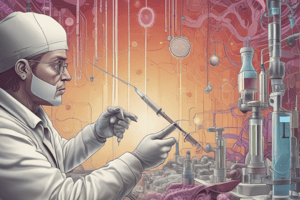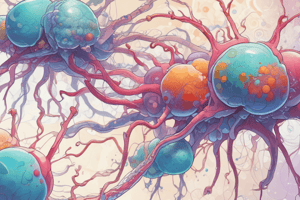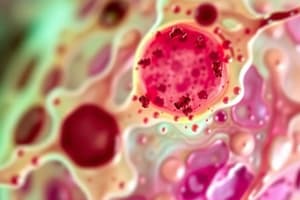Podcast
Questions and Answers
What is the primary purpose of collecting sputum specimens?
What is the primary purpose of collecting sputum specimens?
- To identify specific microorganisms and their drug sensitivities (correct)
- To evaluate heart function
- To assess hydration levels in the patient
- To measure blood pressure effectively
How many early morning specimens are typically required for cytology testing?
How many early morning specimens are typically required for cytology testing?
- One specimen only
- Two specimens on alternate days
- Five specimens throughout the day
- Three consecutively collected specimens (correct)
What is a crucial step to ensure the quality of sputum specimens?
What is a crucial step to ensure the quality of sputum specimens?
- Asking the client to spit into the container
- Insisting on collecting the specimen at night
- Coughing up 4 to 10 mL of sputum (correct)
- Avoiding mouth care before collection
For which condition is the serial collection of acid-fast bacillus (AFB) specimens performed?
For which condition is the serial collection of acid-fast bacillus (AFB) specimens performed?
What personal protective equipment (PPE) is essential for sputum collection in suspected tuberculosis cases?
What personal protective equipment (PPE) is essential for sputum collection in suspected tuberculosis cases?
What should be done if the sputum specimen container becomes contaminated?
What should be done if the sputum specimen container becomes contaminated?
What is a key consideration during pre-test assessment for urine specimen collection?
What is a key consideration during pre-test assessment for urine specimen collection?
Which technique is crucial in the collection of sputum specimens?
Which technique is crucial in the collection of sputum specimens?
During the intra-test phase, what is the nurse’s primary responsibility when collecting a specimen?
During the intra-test phase, what is the nurse’s primary responsibility when collecting a specimen?
Why is it important to explain the purpose of the collection to the client?
Why is it important to explain the purpose of the collection to the client?
Which of the following steps is NOT part of post-test activities?
Which of the following steps is NOT part of post-test activities?
What is the recommended amount of urine to collect for a clean voided specimen?
What is the recommended amount of urine to collect for a clean voided specimen?
What is a necessary action to prevent invalid test results when collecting any specimen?
What is a necessary action to prevent invalid test results when collecting any specimen?
Which instruction is NOT appropriate for urine specimen collection?
Which instruction is NOT appropriate for urine specimen collection?
Which patient preparation step is essential before urine sample collection?
Which patient preparation step is essential before urine sample collection?
What is the purpose of a 24-hour urine collection?
What is the purpose of a 24-hour urine collection?
When should the nurse provide instructions for specimen collection?
When should the nurse provide instructions for specimen collection?
What is a common reason to collect stool specimens?
What is a common reason to collect stool specimens?
Prior to collecting a 24-hour urine specimen, the patient should be instructed to:
Prior to collecting a 24-hour urine specimen, the patient should be instructed to:
In urine testing, what should be ignored when assessing the test strip?
In urine testing, what should be ignored when assessing the test strip?
What is a significant action to take after obtaining a capillary blood specimen?
What is a significant action to take after obtaining a capillary blood specimen?
Which of the following is NOT a specific test performed on urine?
Which of the following is NOT a specific test performed on urine?
What should be done first when starting a 24-hour urine collection?
What should be done first when starting a 24-hour urine collection?
How should the lid be placed on the specimen container after urine collection?
How should the lid be placed on the specimen container after urine collection?
Which of the following indicates a clean-catch urine specimen?
Which of the following indicates a clean-catch urine specimen?
What materials should be avoided when instructing a patient to defecate into a bedpan?
What materials should be avoided when instructing a patient to defecate into a bedpan?
Flashcards are hidden until you start studying
Study Notes
Purpose of Specimen Collection
- Culture and sensitivity tests identify specific microorganisms and their drug sensitivities.
- Cytology involves the collection of three early morning specimens to detect lung cancer and determine specific cell types.
- Acid-fast bacillus (AFB) tests require the collection of sputum over three consecutive days to diagnose tuberculosis (TB).
- Specimen collection is used to assess the effectiveness of therapy.
Responsibilities in Sputum Collection
- Provide mouth care to avoid contamination from oral microorganisms.
- Instruct clients to breathe deeply and cough to obtain 4 to 10 mL of sputum.
- Use gloves and PPE for suspected TB cases and ensure specimen integrity by preventing contact with the outside of the container.
- Offer mouthwash after sputum collection to maintain oral hygiene.
Learning Outcomes
- Discuss nursing responsibilities during specimen collection.
- Explain the rationale behind collecting each type of specimen.
- Describe techniques for collecting stool, urine, sputum, and throat specimens.
- Demonstrate obtaining capillary blood specimens and collecting urine for culture using clean catch methods.
Introduction to Diagnostic Testing
- Diagnostic tests provide critical information about patients.
- Pre-test assessments focus on client preparation, including understanding biological, psychological, sociological, cultural, and spiritual contexts.
- Essential considerations include the patient's pregnancy status and any necessary adjustments for testing procedures.
Intra-Test Responsibilities
- Emphasize proper specimen collection while adhering to standard precautions and aseptic techniques.
- Provide emotional and physical support during testing and monitor vital signs.
- Ensure correct labeling, storage, and transport of specimens to prevent invalid results.
Post-Test Responsibilities
- Focus on nursing care after testing, including comparison of previous and current results.
- Modify nursing interventions based on test outcomes and report findings to appropriate team members.
- Understand the importance of reporting critical test results as mandated by National Patient Safety Goals.
Capillary Blood Glucose Measurement
- Identify glucose levels by collecting capillary blood specimens from the lateral aspect of the finger after cleaning the site.
- Adhere to the steps of purpose, assessment, planning, equipment, implementation, and evaluation during the process.
Responsibilities in Specimen Collection
- Comfort and secure the privacy and safety of clients during specimen collection.
- Explain the purpose and ensure aseptic technique throughout the procedure.
- Address factors such as medication that may affect test results, transport specimens promptly, and report abnormalities.
Stool Specimens
- Purpose includes detection of occult blood, analysis of dietary products, and identification of parasites, bacteria, or viruses.
- Instruct patients to defecate in a clean receptacle without contamination and to use minimal amounts for testing.
- Ensure specimens are sent to the lab immediately to maintain integrity.
Urine Specimens
- Collect clean voided urine for routine urinalysis, and require first morning urine for best results.
- Ensure specimens contain no fecal contamination and are collected without toilet tissue contacting the specimen.
- Specific guidelines should be followed for both standard and timed urine collections to guarantee accurate testing.
Timed Urine Specimens
- Collection periods can range from 1-2 hours to 24 hours to assess kidney function and glucose metabolism.
- Record pertinent information such as start and end times, and ensure all urine produced within the time frame is collected.
Urine Testing Procedures
- Urine tests may assess specific gravity, pH, and the presence of glucose, ketones, protein, or occult blood.
- Testing involves dipping a reagent strip and waiting for precise timing to compare color changes against a standard chart for accurate results.
Sputum Specimens
- Follow specific procedures for sputum collection to ensure valid test outcomes.
- Emphasize the importance of proper technique, timing, and specimen handling throughout the testing process.
Studying That Suits You
Use AI to generate personalized quizzes and flashcards to suit your learning preferences.




